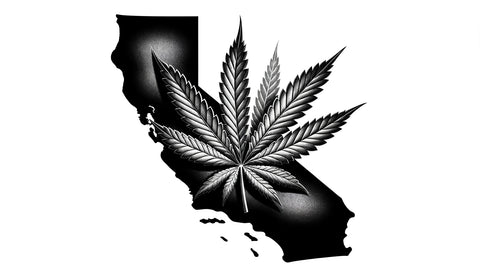As 2024 unfolds, employers across California and Washington are navigating a new reality in workplace drug policies, thanks to recent legislative advancements. These states have enacted laws that redefine the management of off-duty cannabis consumption among employees, marking a pivotal moment in the legal and social narrative of cannabis. This evolution in legislation reflects a broader acceptance of legal cannabis use and poses a challenge to outdated norms in workplace drug testing.
For businesses operating within these legal frameworks, staying informed and adaptable is not merely a matter of legal compliance—it's about moving in sync with shifting societal attitudes towards cannabis consumption. This blog aims to clarify the recent legislative changes, exploring their implications for employers and providing guidance on how companies can transition into this updated legal landscape.
Overview of the New Legislation

At the heart of this legislative shift are California Assembly Bill 2188 (AB 2188), Senate Bill 700 (SB 700), and Washington State Senate Bill 5123 (SB 5123). Both bills took on effect on January 1, 2024, bringing a significant change: they restrict employers from taking adverse actions against job applicants based on their off-duty use of cannabis or the results of pre-employment drug tests that find non-psychoactive cannabis metabolites. This marks a crucial transition from the traditional stance on cannabis, which often saw users facing employment discrimination based on their lawful use of cannabis outside of work hours.
The core aim of these new measures is to protect employees and job applicants who lawfully use cannabis, recognizing a crucial distinction: the presence of non-psychoactive cannabis metabolites in drug tests does not indicate current impairment but only past cannabis consumption. This recognition is a leap forward in ensuring that lawful cannabis users are not unfairly penalized in their professional lives, balancing the need for a safe and productive work environment with personal liberties.
Key Provisions and Impacts in Washington

Washington State's approach, particularly through Senate Bill 5123 (SB 5123), presents a forward-thinking framework in addressing the discrepancy between legal cannabis use and employment practices. This legislation prohibits employers from discriminating against job applicants based on lawful off-the-job cannabis use. This implies that employers in Washington can no longer base their hiring decisions on pre-employment drug tests that detect non-psychoactive cannabis metabolites. These metabolites can linger in the body long after the effects of THC (tetrahydrocannabinol – the active chemical in cannabis) have subsided, making them unreliable indicators of current impairment.
California’s Approach to cannabis Legislation

California's legislation, particularly through Assembly Bill 2188 (AB 2188), mirrors Washington State’s progressive stance on cannabis use in the workplace. AB 2188, prohibits discrimination against employees and job applicants for using cannabis outside of work. It specifically bars employers from making hiring decisions based on tests for non-psychoactive cannabis metabolites. This move is significant in a state where both medical and recreational cannabis use has been legal for years, acknowledging that a positive test for these metabolites is not necessarily indicative of impairment at work.
The bill, however, allows room for employers to maintain certain standards. Employers can still enforce hiring and employment criteria based on valid drug screening methods, as long as they do not detect non-psychoactive cannabis metabolites. Additionally, actions based on the presence of these metabolites are permissible only if the test results demonstrate impairment during work hours.
The nuances in these laws reflect a delicate balance between respecting the legal use of cannabis by employees in their personal time and maintaining a safe, productive work environment. Employers in both states must carefully navigate these changes to ensure compliance while upholding workplace safety and efficiency.
Understanding the Exceptions to the New Laws in Washington and California

While the new legislation in Washington and California marks a significant shift in workplace drug policies concerning cannabis use, it is crucial to understand that these laws come with specific exceptions. These exceptions are designed to address certain job roles and situations where maintaining stricter drug use policies is necessary for safety, security, or compliance with federal regulations.
Exceptions in Washington State’s Legislation:
Washington’s Senate Bill 5123 outlines clear exceptions to the rule against discrimination based on off-duty cannabis use. These include:
Federal Requirements:
Positions requiring a federal background check or security clearance are exempt. This is particularly relevant for jobs that involve national security or sensitive information.
Law Enforcement and Public Safety:
Roles within general authority Washington law enforcement agencies, fire departments, fire protection districts, or regional fire protection service authorities are not covered by the new law.
First Responders and Corrections Officers:
Positions as first responders, including dispatchers for emergency communication systems or those responsible for emergency medical services, as well as corrections officers, are exempt.
Airline and Aerospace Industries:
The law does not apply to jobs in these sectors, recognizing the critical nature of safety in these industries.
Safety-Sensitive Positions:
Employers are allowed to designate certain roles as safety-sensitive, where impairment at work could lead to substantial risk of harm or death. It is incumbent upon employers to identify and clearly define these roles.
Exceptions in California’s Legislation (AB 2188):
California’s law also stipulates specific exceptions:
Building and Construction Trades:
Employees in this sector are not covered by the new protections against discrimination based on cannabis use.
Federal Compliance:
Similar to Washington, roles requiring a federal government background investigation or security clearance are exempt, particularly those adhering to the United States Department of Defense regulations or equivalent regulations for other agencies.
Federal Mandates:
The law does not supersede state or federal laws that require drug testing for controlled substances as a condition of employment, for receiving federal funding, or for entering into a federal contract. This includes compliance with Department of Transportation regulations and other federal mandates.
Both states’ laws reflect a nuanced approach, balancing the rights of employees to engage in legal off-duty cannabis use against the need for safety and compliance with federal requirements in certain job roles. Employers in both states must carefully navigate these exceptions to ensure they remain compliant with the new laws while addressing the specific needs of their organization and industry.
Navigating the Future with Awareness and Adaptability

As we watch the implementation of these groundbreaking laws in California and Washington, it's clear that the landscape of employment and cannabis use is undergoing a significant transformation. For employers, this period represents a time of adaptation, learning, and reevaluation of workplace policies in line with evolving societal norms and legal frameworks.
The changes brought about by AB 2188 in California and SB 5123 in Washington are more than just legal mandates; they are reflections of a broader shift in how we view the intersection of personal lifestyle choices and professional life. These laws challenge long-standing perceptions of cannabis use and open the door for more inclusive and fair employment practices.
In conclusion, the journey towards integrating lawful cannabis use into the workplace is an ongoing process of education, understanding, and adaptation. By embracing these changes with an open and informed approach, employers can foster a workplace culture that is both safe and respectful of individual rights. As we navigate these changes, the focus should remain on creating balanced policies that uphold both employee well-being and organizational integrity.
E1011 Labs: Embracing Change and Promoting Wellness
As E1011 Labs, a pioneer in the field of wellness and alternative therapies, we view the new legislation in California and Washington as a positive step towards acknowledging and integrating the responsible use of cannabis into our societal fabric. Our ethos, centered around harnessing the benefits of cannabinoids for wellness and relaxation, aligns closely with the spirit of these laws. We believe that responsible adult use of cannabis, particularly when it does not impact job performance or workplace safety, should not be a barrier to employment opportunities.
Adapting to New Norms:
At E1011 Labs, we understand the importance of adapting to changing regulations and societal attitudes. The new laws present an opportunity for us to advocate for a balanced approach towards cannabis consumption. We see this as a chance to educate both employers and the wider community about the nuances of cannabis use – distinguishing between responsible consumption and impairment, especially in the workplace.
Promoting a Safe Work Environment:
While we support the lawful use of cannabis, we also recognize the importance of maintaining a safe and productive work environment. We advocate for policies that ensure workplace safety while respecting employee privacy and legal rights. This includes supporting testing methods that accurately reflect current impairment rather than past usage, thereby aligning with the new legislative framework.
A Commitment to Employee Wellness and Rights:
At the core of E1011 Labs’ philosophy is a commitment to the wellness and rights of our employees. We view these legislative changes as an extension of our dedication to creating an inclusive and supportive work environment. By embracing these new laws, we are not only complying with legal requirements but also reinforcing our belief in the therapeutic potential of cannabis and its place in modern wellness practices.
In summary, E1011 Labs embraces these legislative changes as an opportunity to further our mission of promoting wellness and alternative therapies, while balancing the need for a safe and productive workplace. We are committed to leading by example, demonstrating how businesses can adapt to these changes in a way that respects both the law and the well-being of our employees







